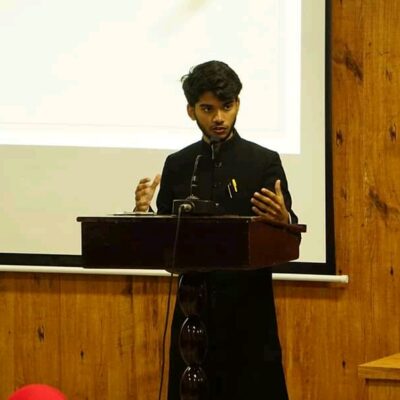Naseeruddin Hashmi
Naseeruddin Hashmi was a writer, researcher and scholar of Dakhniyat (Deccan Studies) from Hyderabad, Dakan. “Dakan meiN Urdu (دکن میں اردو)” is the most famous work of his.
Naseeruddin Muhammad Abdul Bari was born in the respected Hashmi family of Hyderabad on 15th March 1895. He pursued his education in the Dar-ul-Uloom Hyderabad and graduated as a Munshi and Maulvi Aalim from the same institution. He was also a Munshi Fazil from Madras University.
After completing his education he joined the department of Central Record Office (دفتر دیوانی و مال) and retired as a registrar in 1950. He travelled throughout India’s different districts and states; and on the stipend provided by the Asafiya Sultanate, he visited Scotland, France, Italy and Britain for his research work. Karachi, Lahore, Busra, Baghdad, Karbala and Najaf Ashraf are the other places he visited.

موت نے آج یہ کیا سخت ستم توڈا ہے
کتنی بے کس نظر آتی ہے وطن میں اردو
ایک دکنی جو اٹھا، سال یہ رحلت کا ملا
ہاشمی چل بسا، روتی ہے دکن میں اردو
84 (Dakni) – 1428 (Hashmi chal basa, roti hai dakan meiN Urdu) = 1384 Hijri
Akbaruddin Siddiqui composed this chronogram on the death of Hashmi.
Hashmi Sahib’s book “Deccan Mein Urdu” initially published in 1922 gained immense popularity, growing from its original 180 pages to over 1,000 pages by its sixth edition in 1964, released shortly before the author’s demise. This expansion was fuelled by continuous revisions and additions, resulting in numerous reprints and editions by various publishers, both authorised and unauthorised.
The book became a catalyst for extensive research into Urdu language, focusing on its origins and development across different regions of India. Following its widespread acclaim, a plethora of articles and books emerged discussing Urdu’s birthplace and the contributions of diverse regions to its promotion. “Deccan Mein Urdu” not only proposed theories about Urdu’s origins but also featured biographical sketches of poets and writers who significantly influenced Urdu literature in the Deccan, accompanied by critical evaluations and excerpts of their work.
While the book initially posited Deccan as Urdu’s birthplace, subsequent editions and scholarly discourse, prompted by works like “Punjab Mein Urdu” and “Hindustani Lisaniyaat” by Dr. Mohiuddin Quadri Zore and others shifted focus to a purely linguistic analysis of Urdu’s roots. This evolution sparked discussions on Urdu’s development in regions such as Punjab, Delhi, Sindh, Bengal, and beyond, exploring the roles of various communities and ethnicities in fostering its growth.
Hashmi Sahib’s pioneering work thus laid the groundwork for a deeper understanding of Urdu’s linguistic evolution and its cultural significance across India, influencing generations of scholars and researchers in the field.
A list of his essays was published in the Hashmi-Number January 1965 edition of the Urdu monthly magazine – Sabras. Dr. Afzaluddin Iqbal mentions that his works are more than a thousand, and lists of some of them in the preface of “Dakan meiN Urdu”.
Some of his works are listed here:
- Dakan meiN Urdu (first published in 1924, currently 7th or 8th publication is available)
- Salateen e Dakan ki Hindustaani Shayeri (1932)
- Hazrat Amjad ki Shayeri (1934)
- Madras meiN Urdu (1938)
- Maqaalaat e Hashmi (1939)
- Dakni Hindu aur Urdu (1956)
- Europe meiN Dakhni Makhtootaat (1932)
- Daftar e Diwani ke Urdu Makhtootaat (1935)
- Kutub-KHaana Salarjung ki Urdu Qalmi KitaaboN ki Wazahati Fehrist (1957)
- Zikr e Nabi sal Allahu alayhi wa sallam (1934)
- Tazkirah Dar ul Uloom (1944)
- Ahd e Aasfi ki Qadeem Taleem (1946)
- Aaj ka Hyderabad (1953)
- Jung e Aazadi ki Kahaani (1957)
- Maulvi Abdul Qadir (1963)
- Dakni Culture (1963)
- Khawaateen e Ahd e Usmani (1936)
- Janaabaan e Niswaan (1938)
- Khawaateen e Dakan ki Urdu Khidmaat (1940)
- Hyderabad ki Niswaani Dunya (1944)
- Tazkirah Hayaat Bakhshi Begum (1952)
- Najm us Saaqib – Shafa’i Fiqh (1924)
- Rahbar e Safar e Europe (1930)
- Film-numa (1940)
- Maktoobaat e Amjad (1944)
- Zubedah ke Des meiN (1955)
Some of the e-books can be read on Rekhta: https://www.rekhta.org/authors/naseer-uddin-hashmi/ebooks?ref=web

Article contributed by: Riasath Ali Asrar
Riasath Ali Asrar is the founder of Anjuman e Fannan & The Kabikaj Foundation. He also serves as the Editorial and Research Coordinator at The Deccan Archive Foundation. More on: www.asrar.blog
